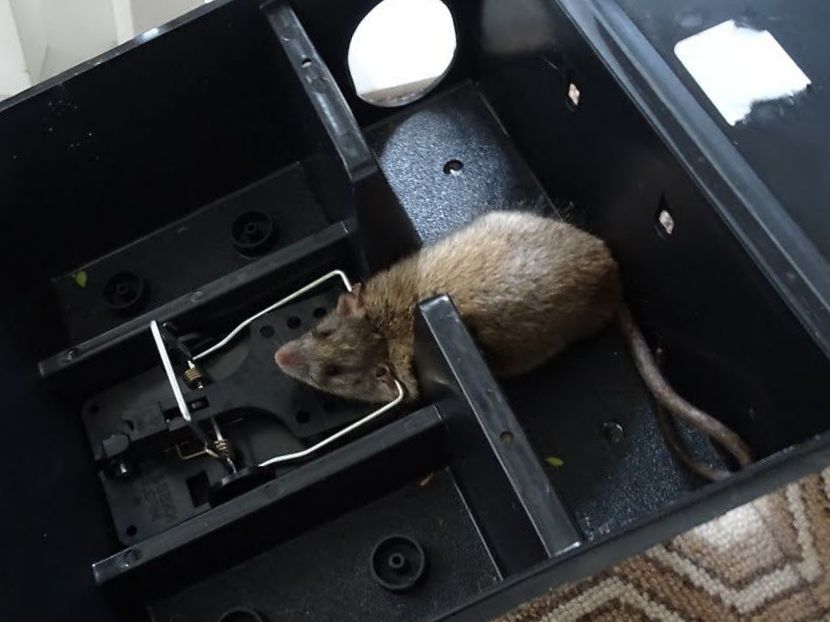
If you want a rat removal project where the outcome is a cruelty-free one, you have two real options. Well, three, but one of them almost always fails and isn't worth trying unless you're an actual rat removal expert. The latter — the one that you shouldn't attempt without expert advice — is exclusion. This ensures the eviction of rats from a building using devices that only allow one-way traffic — right out of the building. Once out, they are unable to get back in again … in theory. It only works when all other holes that lead rats into the building have been sealed, and all rat-related matter removed and cleaned up. This includes using strong enzyme cleaners to break down biological material and remove disease threats.
Exclusion will fail if you do not seal all holes. Exclusion will fail if you do not use the right exclusion devices. Exclusion also doesn't resolve the problem — there are still rats hanging around on your property and now they're working doubly hard to get back in.
Now that we've got that method out the way, it's time to look at the two genuine approaches you have to cruelty-free rat removal.
The first one — snap traps — doesn't sound cruelty-free, but when you look at some of the alternatives you can understand why it makes the animal-friendly list.
Snap traps kill the rat on impact. The rat reaches for the bait that is cleverly placed on the trap, the switch is triggered, the motion is set off and the rat is killed instantly. (Almost always.) You then check the trap, remove it, and replace it with a new one, set with more bait.
Yes, the outcome is death for the animal, but the snap traps do not encourage unnecessary suffering which definitely happens with rodenticides. They can take weeks and months to work, and rats have also shown a very alarming immunity to rat poison over recent years. On top of that, there is a very high chance that a poisoned rat will go on to kill another wild animal that made the mistake of preying on it. A bird of prey, for example, could chase, catch, kill and eat a rat that has been poisoned (but is immune so, therefore, doesn't experience the effects of the poison and has many times the ‘regular' amount in its system), and then die itself as a result of poisoning.
If you'd rather not cause the death of an animal, your final option is a trap-and-release approach. Sadly, this can actually result in the death of a released rat too. Most animals are super social creatures, and rats are definitely much better suited to life in a large group over solitary living. Scientific studies have proven that rats experience the same range of emotions that people do when removed from familiar peers and groups — sorrow, sadness, anger, depression, anxiety, stress, etc.
When you release a stressed or anxious animal into a brand new territory, you are leaving it in a very vulnerable position. A stressed person will not function as well as he or she usually would, and stress and other conditions can have similar effects on animals, too. Rats that are depressed or stressed will actively avoid food or not leave the nest to hunt, and if they do this in their brand new environment, they will become weak and vulnerable to predatory attacks.
Following on from the predatory theme, a rat that has spent almost its entire life in a residential home or neighborhood will have absolutely no clue about the dangers that now awaits it in the wild world you have dumped it in. Rats are usually nocturnal, so releasing the animal first thing in the morning might not always work in its favor because it will be tired, probably hungry, and confused. At the same time, most rat predators (excluding people) are out during the night, so releasing the animal first thing in the morning might actually give it the best chance of survival. It's one of those catch 22 situations — the outcome is likely to be bad whatever you do.
A rat that has been released into the wild will need to find a new spot to call home, and preferably one that offers shelter from weather as well as safety from predators. It will need to locate a source of fresh water to drink and bathe in, and it will also need to find some food … and quick. Could you do all of that whilst being on the lookout for your life, after being awake all night? How do you expect a rat to?
There really isn't a 100% cruelty-free way to deal with a rodent infestation, but you definitely can't leave it where it is. This is not an animal that will move along of its own accord after a few weeks, and it probably won't find somewhere else if you turn on the lights or make a bit of noise. This is an animal that is here to stay. All the while it has access to your home, food, water, and plenty of warmth, it will continue to stay there, causing damage, spreading disease, and generally making a nuisance of itself.
Go back to the pestcontrolrat.com home page.
Copyright 2021 - pestcontrolrat.com
Nationwide Rat Control Services